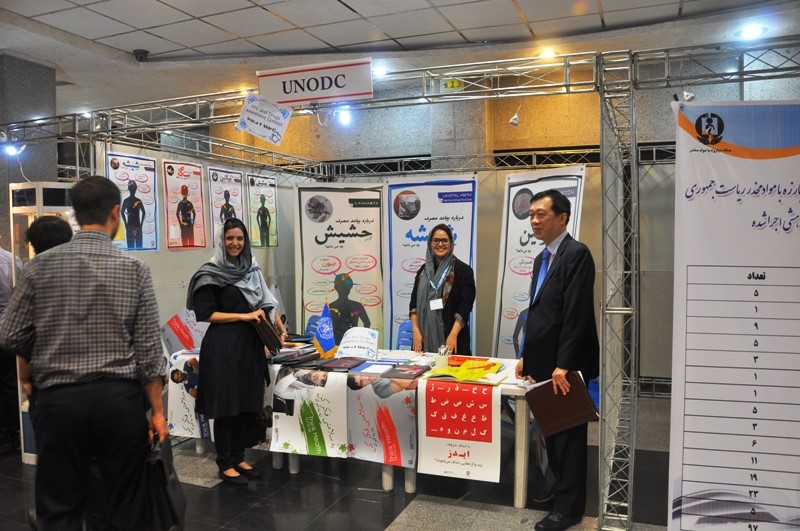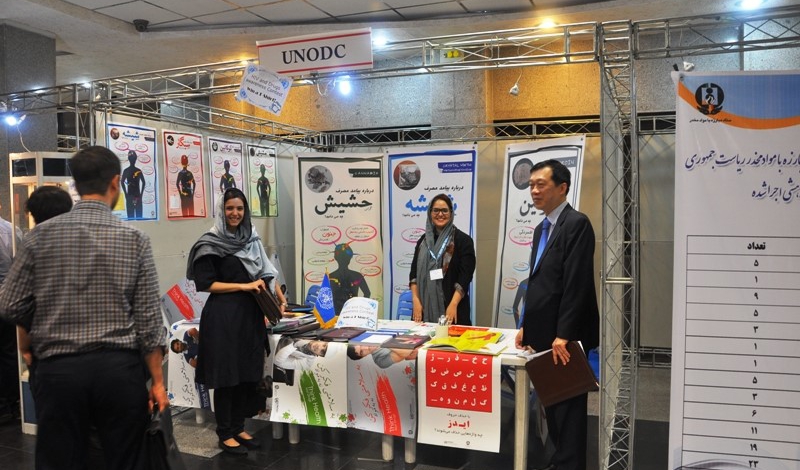 10 September 2014. About 80 representatives of active non-governmental organizations in the area of cultural property as well as experts of Iranian Cultural Heritage, Handicraft and Tourism Organization (ICHHTO) and governmental officials attended the meeting on the �Role of Civil Society in Counter Trafficking in Cultural Property� on 09 September 2014, in Nivaran Palace. This initiative was jointly organized by ICHHTO and UNODC Iran as part of their programmes to raise awareness and capacity building on combating trafficking in cultural property, art and antiquities in line with the United Nations Transnational Organized Crime (UNTOC) Convention.
10 September 2014. About 80 representatives of active non-governmental organizations in the area of cultural property as well as experts of Iranian Cultural Heritage, Handicraft and Tourism Organization (ICHHTO) and governmental officials attended the meeting on the �Role of Civil Society in Counter Trafficking in Cultural Property� on 09 September 2014, in Nivaran Palace. This initiative was jointly organized by ICHHTO and UNODC Iran as part of their programmes to raise awareness and capacity building on combating trafficking in cultural property, art and antiquities in line with the United Nations Transnational Organized Crime (UNTOC) Convention.Speaking at the opening ceremony of the meeting, Deputy Planning and Investment of ICHHTO, Mr. Saeed Shirkavand stated that lack of a well-established mechanism to assist owners of cultural artifacts to sell or legally trade their property is among the main causes of predominance of trafficking in cultural property. He continued by adding that establishment of such mechanism to encourage public to come forward with their inherited or found artifacts is one of ICHHTO�s main goals. He also highlighted the role NGOs could play in the society to raise the awareness of public on the threats of trafficking in cultural property to the identity and culture of the people and stated that NGOs could undertake the role of public educators in this respect.
�The UNODC Iran Representative, Mr. Leik Boonwaat, highlighted the fact that despite continued efforts by the international community, trafficking in cultural property, arts and antiquities has been increasingly growing both as a form of organized crime as well as an important source for laundering the proceeds of crime. He added that a coordinated and substantive approach at the national, regional and international levels is necessary to better tackle drug trafficking and criminal activities, such as trafficking in cultural property, arts and antiquities which requires national coordination, improved national legislation in accordance with the United Nations instruments and standards, and building academic knowledge and capacities among decision-makers and practitioners, civil societies and NGO�s. Mr. Boonwaat stated that in response to this growing threat, UNODC works to harness the potential of the United Nations Convention against Transnational Organized Crime and in line with this convention has piloted an innovative initiative with the objective of enhancing national capacity in countering trafficking in cultural property, art and antiquities under �Country Program for Iran 2011-2014�. At the end, he stated that with this meeting we are hoping to make the discourse of protection of cultural property a public one. Definitely, where public�s awareness is high, it will be easier to monitor and preserve archaeological sites, monuments and cultural institutions, and this is where the role of NGOs and civil societies become important.

UNODC Iran Representative, Mr. Leik Boonwaat calls for coordinated approach all levels against drug trafficking and criminal activities, such as trafficking cultural property, arts and antiquities.
The Director and Representative of UNESCO cluster office in Tehran, Ms. Esther Laroche, highlighted the response of UNESCO to the increasing number of thefts both in museums and at archaeological sites in the form of 1970 Convention which is the first international legal instrument dedicated to combating trafficking in cultural property in times of peace. Referring to the devastating humanitarian news from Iraq and Syria, Ms. Laroche stated that protecting heritage is inseparable from protecting populations, because heritage enshrines people�s identities and that is the reason why Director General of UNESCO has sent a circular letter to all countries, INTERPOL, the World Customs Organization, and the art market to urge for extreme vigilance and scrutiny for all objects coming from these states. Pointing to the increasing number of criminal activities and prevalence of trafficking in cultural property, she stated that most of the regulations already exist, but the challenge now is to ensure that they are better known to all, applied more vigorously and effectively enforced.

Civil society plays an important role in counter trafficking of cultural properties.
The meeting was attended by Prof. Carlo Cereti, Cultural Attach� of the Italian Embassy and Dr. Janet Blake, Law Professor of Shahid Beheshty University as the special guests of the meeting. During the working session meeting, Mr. Sefat Shemirani, UNODC National Program Coordinator, described the nature of transnational organized crime and how it is linked to trafficking n cultural property. In his presentation he referred to the growing activities of criminal organized groups which are threatening and challenging the social and economic development and security of societies around the world. He provided the meeting with statistical information on the alarming rate of proceeds of crimes of such illegal activities. In addition, Ms. Laroche and Dr. Blake both emphasized on the �preventive role of NGOs�. In this regard, Dr. Blake while emphasizing on the importance of education in countering trafficking in cultural property, recommended that NGOs could be the right hand of the government by providing them consultancies and information on local areas.
The three panels of the meeting covered wide range of topics including the role of NGOs as the watchman of the historical sites in protecting cultural property, the dimension of TOC, including trafficking in cultural property and importance of fight against trafficking in cultural property related areas. The panelists were distinguished members of International Legal Office of President, Dr. Mohsen Mohebbi, Secretary of Cultural Heritage Fraction of the Parliament, Dr. Bozorgian, and Director General for Legal Affairs of ICHHTO, Mr. Omid Ghanami, Director General for the Office of Community Affairs & NGOs, as well as Head of Public Relations office of ICHHTO, Mr. Arefnia. During the meeting representatives of NGOs were given the time to directly voice their concerns over the local situation of their cultural heritage of their provinces.
By United Nations In Iran
The Iran Project is not responsible for the content of quoted articles.











